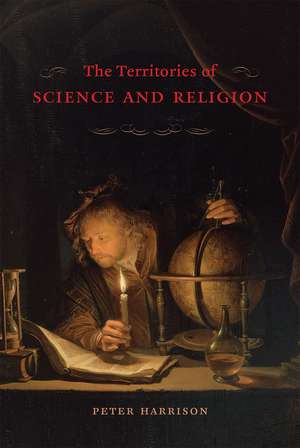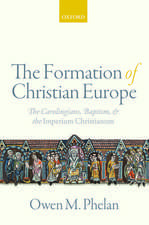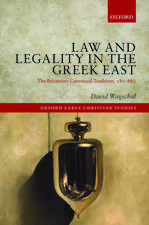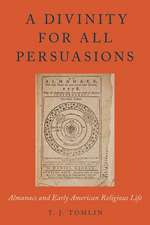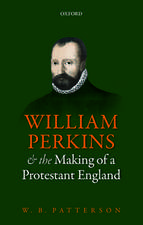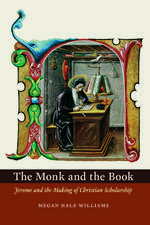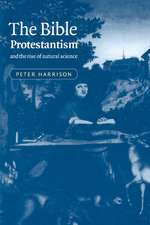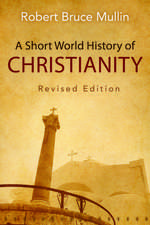The Territories of Science and Religion
Autor Peter Harrisonen Limba Engleză Paperback – 7 mar 2017
The conflict between science and religion seems indelible, even eternal. Surely two such divergent views of the universe have always been in fierce opposition? Actually, that’s not the case, says Peter Harrison: our very concepts of science and religion are relatively recent, emerging only in the past three hundred years, and it is those very categories, rather than their underlying concepts, that constrain our understanding of how the formal study of nature relates to the religious life.
In The Territories of Science and Religion, Harrison dismantles what we think we know about the two categories, then puts it all back together again in a provocative, productive new way. By tracing the history of these concepts for the first time in parallel, he illuminates alternative boundaries and little-known relations between them—thereby making it possible for us to learn from their true history, and see other possible ways that scientific study and the religious life might relate to, influence, and mutually enrich each other.
A tour de force by a distinguished scholar working at the height of his powers, The Territories of Science and Religion promises to forever alter the way we think about these fundamental pillars of human life and experience.
In The Territories of Science and Religion, Harrison dismantles what we think we know about the two categories, then puts it all back together again in a provocative, productive new way. By tracing the history of these concepts for the first time in parallel, he illuminates alternative boundaries and little-known relations between them—thereby making it possible for us to learn from their true history, and see other possible ways that scientific study and the religious life might relate to, influence, and mutually enrich each other.
A tour de force by a distinguished scholar working at the height of his powers, The Territories of Science and Religion promises to forever alter the way we think about these fundamental pillars of human life and experience.
Preț: 177.87 lei
Nou
Puncte Express: 267
Preț estimativ în valută:
34.04€ • 35.16$ • 28.33£
34.04€ • 35.16$ • 28.33£
Carte disponibilă
Livrare economică 05-19 martie
Livrare express 18-22 februarie pentru 26.56 lei
Preluare comenzi: 021 569.72.76
Specificații
ISBN-13: 9780226478982
ISBN-10: 022647898X
Pagini: 300
Ilustrații: 13 halftones
Dimensiuni: 152 x 229 x 22 mm
Greutate: 0.43 kg
Editura: University of Chicago Press
Colecția University of Chicago Press
ISBN-10: 022647898X
Pagini: 300
Ilustrații: 13 halftones
Dimensiuni: 152 x 229 x 22 mm
Greutate: 0.43 kg
Editura: University of Chicago Press
Colecția University of Chicago Press
Notă biografică
Peter Harrison is professor of the history of science and an Australian Laureate Fellow at the University of Queensland. He is the author of numerous books, including The Fall of Man and Foundations of Science, and is the coeditor, with Ronald L. Numbers and Michael H. Shank, of Wrestling with Nature: From Omens to Science, also published by the University of Chicago Press.
Cuprins
Preface
A Note on the Graphs
1. The Territories of Science and Religion
2. The Cosmos and the Religious Quest
3. Signs and Causes
4. Science and the Origins of “Religion”
5. Utility and Progress
6. Professing Science
Epilogue
Acknowledgments
Abbreviations
Notes
Bibliography
Index
A Note on the Graphs
1. The Territories of Science and Religion
2. The Cosmos and the Religious Quest
3. Signs and Causes
4. Science and the Origins of “Religion”
5. Utility and Progress
6. Professing Science
Epilogue
Acknowledgments
Abbreviations
Notes
Bibliography
Index
Recenzii
"Harrison's work is an admirable contribution to the history of science and religion. Though it's aimed mainly at an academic audience, general readers will also be interested in this analysis and its challenges to assumptions about both disciplines."
"[Harrison's] is a careful and nuanced scholarship, which is precisely why it doesn’t get much play in a public discourse invested in the clickbait of the conflict metaphor. In Territories, first presented at the 2011 Gifford Lectures in Edinburgh, Harrison builds on his previous work to take on the new atheist 'conflict' party more directly. The bulk of the book is a patient, fine-grained archaeology of the terms 'science' and 'religion.' Indeed, in some ways, Harrison has written a biography of these concepts."
"Harrison wisely notes that those who want there to be ‘conflict between science and religion’ are unlikely to yield to the historian’s pen. A sophisticated analysis of the kind he has provided nonetheless prompts many searching questions, not least about the residual place, if any, of moral sensibilities in scientific research. . . . Extremely rewarding."
"Harrison’s The Territories of Science and Religion is a subfield-defining book. It decisively demonstrates that presuming either conflict or collaboration between science and religion is premature: a preliminary to any exploration of those connections must begin with a recognition that we do not know what those terms mean, and that the jumble of meanings that we have inherited have been clumped together in starkly different ways throughout the history of western thought."
"The complexities of ancient attitudes toward our cherished practices, which we assume had to be valued by all reasonable ages, can be found admirably laid out in Peter Harrison’s invaluable new tome, The Territories of Science and Religion. Harrison’s book deserves a place right next to all your most important critiques of modernity and genealogies of secularization."
"Harrison’s purpose in this brilliant survey is not to pretend that there is or can be no conflict between 'religion' and 'science.' Rather it is point to the fact that those categories are not self-evident, still less timeless, and that any conflict--or indeed any independence, dialogue or integration--between them will depend largely on how each of the territories is defined. His study ends towards the end of the 19th century but it is a lesson we still need to hear today."
Harrison’s purpose in this brilliant survey is clearly, therefore, not to pretend that there is or can be no conflict between ‘religion’ and ‘science’. Rather it is point to the fact that those categories are not self-evident, still less timeless, and that any conflict – or indeed any independence, dialogue or integration – between them will depend largely on how each of the territories is defined."
"Contemporary debates would lead you to believe that science and religion are eternally at odds with each other. In The Territories of Science and Religion, Harrison interrogates the modern assumptions behind this viewpoint and delineates the story of the categories science and religion. He shows that understanding these concepts divided as distinct realms of inquiry is a relatively recent history, politically shaped, and often accidental in its construction. In reality, what we conceptualize as these two separate spheres of life were intimately bound up with one another, often in concert in social life. Harrison also warns us about the consequences of projecting our contemporary conceptual spheres back through the past. In our conversation we discuss ancient Greek philosophy, early Christian thought, natural theology and natural philosophers, conceptions of progress, forms of charity, the professionalization of science, and the creation of scientists."
"It is always a pleasure to observe Harrison deploying his skill in argument, repertoire of apt quotations, and power of analogy. One argument joins so neatly to the next that it seems willfull to withhold assent from the conclusion."
"The Territories of Science and Religion is relevant as a study of semantic change, and to the field of conceptual history. Obviously, it is also relevant in the history of science, the history of religion, and the history of the various intersections of these categories....An impressive and welcome work. The straightforward narrative of the book also makes it a great read."
"This book is excellent. In less than 200 pages, Harrison transports his reader from Thales’ Miletus six centuries before Christ across the Middle Ages to Victorian Britain, following the footprints of 'science,' 'religion,' 'philosophy,' 'belief,' and a host of other related Latin and English words. The traditional chronological framework of the history of science endures; its content, though, is new."
"A bare-bones summary of Harrison’s argument hardly does justice to its
originality and subtlety, nor to the arresting insights that he derives from wellchosen
examples....Impressive chronological scope and erudition."
originality and subtlety, nor to the arresting insights that he derives from wellchosen
examples....Impressive chronological scope and erudition."
"Harrison’s new book,Territories of Science and Religion is essential reading. It is the most important study of the history of science and religion since the publication in 1991 of John Brooke’s Science and Religion: Some Historical Perspectives."
"Harrison’s account affords us crucial insights about the way in which the separation between the territories of science and religion eventually emerged. Moreover, it provides an ever-useful warning against projecting contemporary categories, even those we today consider foundational, back on the history that eventually brought them about."
"Harrison’s new book, a revision of his 2011 Gifford Lectures and the capstone to a series of books about religion and science, combines his genealogical studies of 'religion' with a similar genealogy of modern concepts of 'science'."
"A well-researched, richly detailed argument for how the epistemological map of nature in the West was radically redrawn in the passage to modernity, sharply distinguishing facts from values in the creation of the specifically modern territories of science and religion. . . . The Territories of Science and Religion helps us rethink the origins of the key modern categories of science and religion, and in doing so provides a new vantage point on the rise of modernity. If you happen to be new to Harrison’s work, this tome will leave you searching for more by this fine scholar."
"Classical thinkers understood scientia and religio as qualities or virtues; beginning around the 16th century, however, the meanings gradually shifted such that both were understood as entities conceived in terms of doctrines and practices. This shift, Harrison contends, was the precondition for modern conflicts between science and religion. Considering important turning points in a long swath of Western history from the classical world to the present, Harrison analyzes past activities connected to our present understanding of these terms, including natural philosophy, theology, belief, and doctrine. Arguing cogently and persuasively on a vital topic, The Territories of Science and Religion is a much-needed scholarly work."
“Simply put, Peter Harrison’s The Territories of Science and Religion is the most significant contribution to the history of science and religion since the appearance of John Hedley Brooke’s landmark study, Science and Religion: Some Historical Perspectives, nearly a quarter-century ago. Drawing on his wealth of historical, philosophical, and linguistic knowledge, Harrison provides a fresh, authoritative introduction to this still all-too-often misunderstood topic.”
“Learned, lucid, and illuminating, Peter Harrison’s analysis of scientia and religio from antiquity to the present shows how their non-linear transformation from interior virtues to exteriorized bodies of knowledge made possible the creation of the later nineteenth-century myth about an allegedly timeless ‘conflict between science and religion.’ One hopes that not only historians of science and religion but also contemporary perpetuators of the myth read and learn from this book.”
“This is one of the most sophisticated accounts of the supposed battle between science and religion that I have read. The strategy taken is historical: Harrison argues that science and religion as we now understand them are both recent concepts, and that in the past, they were more complementary than opposed. In this way the author hopes to undermine the idea that there is an eternal and fundamental tension between the two. Superbly documented and incisively argued, this book brings a welcome new perspective on a difficult debate.”
